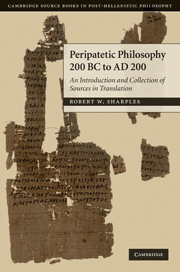Book contents
- Frontmatter
- Contents
- Preface
- Abbreviations
- Introduction
- Individuals
- Logic and ontology
- Chapter 7 The Categories
- Chapter 8 The Categories
- Chapter 9 The Categories
- Chapter 10 The Categories
- Chapter 11 On Interpretation
- Chapter 12 Ontology
- Chapter 13 Logic
- Chapter 14 Theory of knowledge
- Ethics
- Physics
- Bibliography
- Index of sources
- Index of passages cited
- Index of personal names (ancient)
- General index
Chapter 14 - Theory of knowledge
Published online by Cambridge University Press: 05 June 2012
- Frontmatter
- Contents
- Preface
- Abbreviations
- Introduction
- Individuals
- Logic and ontology
- Chapter 7 The Categories
- Chapter 8 The Categories
- Chapter 9 The Categories
- Chapter 10 The Categories
- Chapter 11 On Interpretation
- Chapter 12 Ontology
- Chapter 13 Logic
- Chapter 14 Theory of knowledge
- Ethics
- Physics
- Bibliography
- Index of sources
- Index of passages cited
- Index of personal names (ancient)
- General index
Summary
Aristocles, On Philosophyf4.10 Chiesara, reported by Eusebius, Preparation for the Gospel 14.18.19
And when [the Pyrrhonian Sceptics] say that all things are unclear, it is worth asking from where they actually learned this. For they must first know what the clear is; for on this [basis] at least they would be able to say that things are not like this. For it is necessary to know the positive statement first, and [only] then the negative one. But if they do not know what the clear is like, they cannot know what the unclear is, either.
Aristocles, On Philosophyf6.9–10 Chiesara, reported by Eusebius, Preparation for the Gospel 14.20.9–10
(1) But since even now there are some [the Epicureans] who say that every sensation and every impression is true, let us say a little about them also. These people seem to be afraid that if they said that some sensations are false, they would not have a criterion or rule that was firm or reliable. (2) But they do not see that thus they are immediately saying that all opinions, too, are true. For we naturally judge many things by these. But none the less they judge that some [opinions] are true, others false. (3) Next, if someone considered, he would see that not even of the other criteria is any free from falsity always and throughout, I mean, for example, a balance and compasses, and the like. But each of them is sound when it is in one condition, faulty when it is in another, and when it is used in one way it gives the true answer, in another way a false one. (4) Indeed, if every sensation were true, they ought not to be so different. For they are different when close at hand and far away, in the sick and the healthy, in craftsmen and in laymen, in the wise and in the foolish. (5) It would be altogether absurd to say that the sensations of the mad are true, and of those who mis-see and mis-hear. For it would be simple-minded to say that the person who mis-sees either sees [the object] or does not see it; for one could reply that he sees [it], but [does so] incorrectly.
- Type
- Chapter
- Information
- Peripatetic Philosophy, 200 BC to AD 200An Introduction and Collection of Sources in Translation, pp. 101 - 108Publisher: Cambridge University PressPrint publication year: 2010



